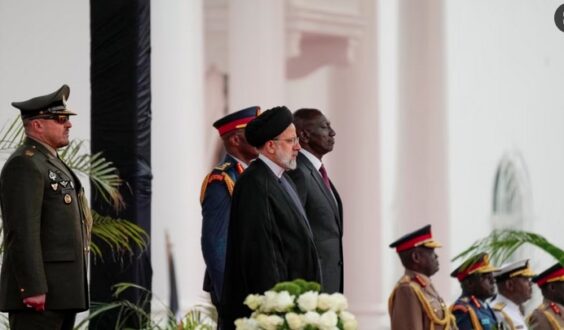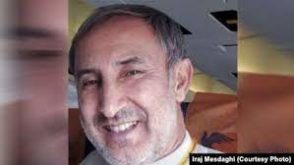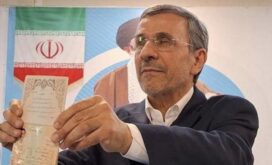iranintl – Ebrahim Raisi, effectively appointed by Iran’s Supreme Leader as president in June 2021, was killed in a helicopter crash on May 19, exactly 63 years and five months after his birth in northeastern Iran.
This is the story of a young member of the Death Committee that ordered the execution of around 5,000 political prisoners serving their prison terms in 1988. He loyally served the clerical regime for 45 years and finally was elected President after Ali Khamenei’s men barred most serious rivals from running as candidates.

“The greatest crime in the Islamic Republic since the beginning of the revolution was committed by you. In the future, you will be remembered among the criminals of history.” These were the words that Ayatollah Hossein Ali Montazeri, the dismissed deputy of the Islamic Republic’s first Supreme Leader, Ruhollah Khomeini, said to a group of five that later became known as the Death Committee on August 15, 1988. One of them was the 28-year-old deputy prosecutor of Tehran, Ebrahim Raisi. The eighth president of the Islamic Republic was killed in an aviation accident taking many secrets to the grave with him. Ebrahim Raisi was born in December 1959 in Mashhad and completed his primary education at Javadiyeh Elementary School in this city, after which he enrolled in a seminary and never received a standard education.
He entered the seminary in Qom in 1975 and began his clerical studies at Boroujerdi School, supervised by Morteza Pasandideh, the elder brother of Ruhollah Khomeini. In fact, when the Islamic Republic was established in 1979, Raisi was 19 years old and four years into his clerical studies. At 20 years old, with only five years of clerical study, he was appointed as a deputy prosecutor in Karaj. Islamic law needed clerical prosecutors and judges whose main education was knowing the Sharia.
In 1982, at the age of 22, he became the prosecutor of Hamedan and married Jamileh Alamolhoda, daughter of Ahmad Alamolhoda, the current Friday prayer Imam of Mashhad. At 25, in 1984, Raisi was appointed deputy head of the Revolutionary Court and, in 1988, as deputy prosecutor of Tehran, he joined the Death Committee, which directed the execution of thousands between August and September 1988.

After Khomeini’s death, from 1989 to 1993, he served as Tehran’s first prosecutor under Ali Khamenei’s leadership. From 1993 to 2003, he was the head of the General Inspection Organization. From 2003 to 2013, under the judiciary chiefs Mahmoud Hashemi Shahroudi and Sadeq Larijani, he served as the first deputy head of the judiciary. For a short period from 2014 to 2015, he was the Attorney General of Iran. From 2015 to 2019, Ali Khamenei appointed him as the custodian of Astan Quds Razavi, an important and wealthy Shiite shrine. During this period, rumors about his potential succession to Khamenei intensified, fueled by images of his meetings with IRGC commanders and a special envoy from Putin.
Raisi attempted to change his appearance, wearing a cloak instead of his traditional robe, and engaged with people in Khorasan, hoping to win the 2017 presidential election. However, he was defeated by Hassan Rouhani, receiving about 16 million votes compared to Rouhani’s 24 million. Following Sadeq Larijani’s controversial departure from the judiciary, Raisi, after failing to secure the presidency, was appointed head of the judiciary by Ali Khamenei.
Images of senior IRGC commanders meeting with Ebrahim Raisi at Astan Quds fueled speculation about his potential succession after Khamenei. During his tenure, he conducted high-profile trials, such as that of Akbar Tabari, the former deputy of Sadeq Larijani, building an anti-corruption image while sidelining Larijani, who was considered a potential successor to Khamenei. During this time, he held another significant position. From June 2012 to September 2021, he was the prosecutor of the Special Clerical Court, an institution established by Ruhollah Khomeini and operating outside the judiciary, directly overseen by the Supreme Leader, dealing with clerical infringements.
In 2021, Raisi entered the presidential race again, winning one of the lowest-turnout elections in the history of the Islamic Republic. His presidency was marked by severe economic recession and inflation, as sanctions imposed by former US President Donald Trump and worsening mismanagement and corruption ravaged the economy.
His weak and often blundering speeches cast a shadow over his aspirations for succession. Three years into his presidency, economic indicators reached unprecedented lows. The most intense wave of protests, strikes, and the revolutionary uprising of 2022 occurred during his tenure. On May 19, 2024, at the age of 63, Ebrahim Raisi died without realizing his ultimate dream of becoming the Supreme Leader, remembered by Iranians for many blunders that revealed his lack of education, and his role in the Death Committee.
 Shabtabnews In this dark night, I have lost my way – Arise from a corner, oh you the star of guidance.
Shabtabnews In this dark night, I have lost my way – Arise from a corner, oh you the star of guidance.



